What began in 2006 as a discreet solo outlet for multi-instrumentalist Jakob Brixen has now expanded into Mechanical Bird, a free-ranging sextet with a hearty fondness for the wyrder end of late-60s folk. Bitter Herbs takes up where 2011’s Daughter Of The Wind left off, tapping into the woodland folklore of sprites and heathen goddesses to create a record that owes as much to Sandy Denny-era Fairport as it does more modernist fancies like Espers.
Seven Valleys, led by Brixen’s spriggish banjo line, even recalls the propulsive gallop of defunct alt.country types Sixteen Horsepower, as does the similarly inclined A Lilac Scent.
Often these songs build slowly, centred around the vocal interplay between Brixen and Sarah Hepburn, before filling out into something grand and busy, full of mandolins, flutes, violins and the organ surges of Nikolaj Paakjaer Mikkelsen (a dead ringer for Graham Nash circa 1973).
It doesn’t always work: the bittersweet pop of The Incredible Sadness sounds curiously out of step, more akin to Prefab Sprout or Lloyd Cole than anything else here. Ultimately though, Bitter Herbs is an invigorating mindtrip into the deep dark woods.

